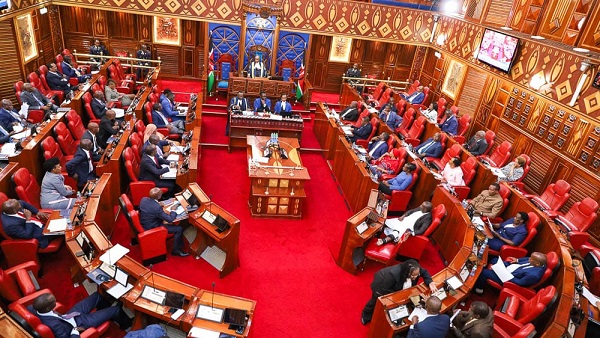Offices of the Senate
The Offices of the Senate include; Office of the Speaker; Office of the Deputy Speaker; Office of the Senate Majority Leader; Office of the Senate Minority Leader; Office of the Majority Whip; Office of the Minority Whip; Office of the Clerk of the Senate and Office of the Senior Deputy Clerk.
The Speaker and the Deputy Speaker
Article 106 of the Constitution provides that there shall be a Speaker for each House of Parliament who shall be elected by that House in accordance with the Standing Orders.
Roles and Functions of Office of the Speaker of the Senate
The Speaker of the Senate shall have the following duties and responsibilities:-
Article 107 of the Constitution provides that “at every sitting of a House of Parliament the Speaker presides” and that during a joint sitting of the two Houses of Parliament, the Speaker of the National Assembly shall preside assisted by the Speaker of the Senate;
The Speaker of the Senate shall preside over all debates of the Senate and enforces the observance of the Constitution, the Standing Orders, relevant statute and parliamentary traditions, procedures and practices;
The Speaker administers the oath of affirmation or allegiance to Senators and issues writs for vacant senatorial seats;
The Speaker protects the rights of the minority while making sure that the majority have their way;
Organizing the business of the House as he/she is a Member of the House Business Committee;
Spokesperson of the Senate and shall ensure that the dignity of the Senate and by extension, Parliament, is upheld and its rights and privileges are not abused;
The Speaker represents Parliament to the outside world as the branch Chairperson of a number of inter-parliamentary organizations;
The Speaker is the final authority on all matters touching on the interpretation and application of the practice and procedure of Parliament at all times.
Roles and functions of the Deputy Speaker of the Senate
Article 106 (b) of the Constitution provides that there shall be a Deputy Speaker for each House of Parliament who shall be elected by that House in accordance with the Standing Orders.
The Deputy Speaker performs the following duties and responsibilities:-
Article 107 (b) of the Constitution provides that the Deputy Speaker of a House of Parliament shall preside over the sitting of that House in the absence of the Speaker;
The Deputy Speaker, according to Standing Order No. 15, is the Chairperson of Committees of the Whole House and shall preside over Committees of the Whole House;
The Deputy Speaker deputizes the Speaker and assists in ensuring the dignity of Parliament is upheld, its rights and privileges are not abused and generally assists in the interpretation and application of the practices and procedures of Parliament at all times.
Majority Leader and Minority Leader
Standing Order No. 19 provide for a leader of the majority party in the Senate. The Senate Majority Leader is elected from amongst Senators from the largest party or coalition of parties. The Senate Majority Leader spearheads the legislative agenda of the largest party or coalition of parties in the Senate.
Standing Order No. 20 provide for the leader of the minority party in the Senate. The Senate Minority Leader is elected from amongst Senators from the minority party or coalition of parties. The Senate Minority Leader spearheads the legislative agenda of the minority party or coalition of parties in the Senate.
Majority Whip and Minority Whip
Standing Order No. 2 provide for a Senator designated by a parliamentary party as its party whip for the purposes of the transaction of business in the Senate. In parliamentary traditions and practices, Majority and Minority whips perform the following roles:-
Ensuring that Senators of their respective parties attend to House business particularly when there is contentious business to be transacted with a view to ensuring that each party’s policy stance/agenda is passed;
Selecting Senators from their respective parties to serve in various Committees;
Enforcing party discipline among Senators and disciplining errant Senators.
Clerk and Senior Deputy Clerk
The Clerk of the Senate is the administrative and procedural head of the Senate and oversees the day-to-day operations and affairs of the Senate. The Clerk of the Senate as provided for in Article 128 of the Constitution is also the Secretary to the Parliamentary Service Commission and Chief Executive Officer of the Parliamentary Service. The Clerk’s roles and responsibilities are further expounded in the Part 3.
The Senior Deputy Clerk is the second senior-most officer in the Senate and the immediate deputy to the Clerk of the Senate. The Senior Deputy Clerk deputizes the Clerk in the management of the affairs of the Senate.




















